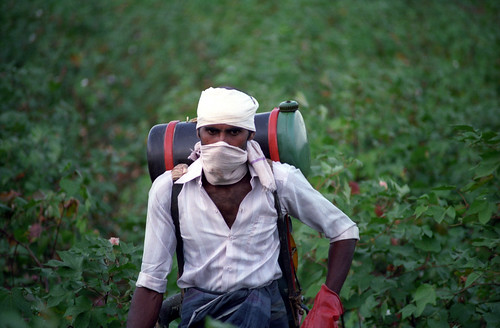 |
| Farmer spraying a cotton field. Photo by IFPRI Images on Flickr |
Professor Stone describes Indian farmers as being on a “seed and pesticide treadmill”. The modern high-yielding hybrid seeds they are now planting are prone to pest attack, and have led to increased use of modern chemical pesticides. These two technologies have changed quickly over the years in response to successive problems emerging in one which exacerbate the problems emerging in the other. The more recent Bt-gene technology certainly didn't create the treadmill, but it has made it much worse.
Biotech industry tactics to achieve this treadmill are interestingly simple. First, instill the idea that farmers are “backward, tradition-bound idiots who need to be told how to farm”, and unable therefore unable to learn how to modify their farming practises by themselves. Second, produce the magic GM seed containing its own pre-packaged idiot-proof technology which no one can get wrong, and which is so simple that “all that farmers have to do is plant the seeds and water them regularly” (Bruce Chassey). Next add deceptive labels into the mix and keep changing the technology before anyone has time to notice anything wrong. Finally, depict farmers as wise when they adopt the technologies and praise them for their astute observation of how well the seed performs.
The reality is that, by giving farmers no time to evaluate seed performance as they would previously, the ever-changing technology packages result in deskilling. Since there's nothing else to guide them, Stone notes that farmers fall back on “an extraordinarily high degree of emulation” and “localised fads”.
Once the process is complete, the biotech company can further hype it as 'proof' that its GM seed perform as claimed: “The ever increasing Bollgard (Bt cotton) plantings demonstrate that the Indian farmer is willing to adopt a technology that delivers consistent benefits in terms of reduced pesticide use and increased income. Farmers recognise the value of Bollgard, which continues to gain acceptance.” (Monsanto 2005) All the better to convince more farmers to keep up with the Jones's and adopt whatever magic GM potion the industry has concocted for them.
More that 90% of the cotton in cotton-growing areas of India is now under Bt cotton. Last year, the government in Maharashtra announced a bailout package of compensation to farmers whose Bt cotton crops had failed; this has been the second such problem in five years. Elsewhere, farmers have complained that the cottonseed cakes available in the market are harming their cattle, causing disease, loss of appetite, reduced milk production, premature deliveries and sudden deaths from unknown causes. There are concerns that the level of farmer suicides linked to the debt caused by the expensive GM technology is being disguised by the government by classifying them as either 'genuine' suicides, which become official statistics, or 'non-genuine' ones which are discounted.
At least one Indian State, however, has decided to have none of it. The Kerala Government has announced it will not permit GM trials nor even research. (Presumably Monsanto will take this as a demonstration that GM is not delivering benefits?)
Over the border in Pakistan, the biotech industry is not, it seems, getting a chance to start its sales routine of depicting the farmers as hapless, tradition-bound dunces when they do not buy its agri-technologies and depicting them as wise when they do.
Back in June 2011, sources in the federal Ministry of Food and Agriculture revealed something embarrassing. Extensive secret discussions were on-going between the government and GM seed companies intent on slipping their GM corn into the country and avoiding any opportunity for outcry. Not only that, but the government committee responsible for evaluating GM crop applications tried to adopt a report with 'Recommendations and Findings' which had actually been prepared by Monsanto Pakistan itself.
The 2012 new year has kicked off with a decision to drop the whole idea of introducing Bt cotton seed in collaboration with Monsanto. This was primarily on financial grounds and because the Bt seed on offer doesn't protect against cotton-growers' main pests problems in Pakistan, but also because the government had taken a long, hard look at what has happened in India and decided that there were no signs of “a technology that delivers consistent benefits in terms of reduced pesticide use and increased income” to farmers. In fact, experts claim that, despite having the latest 'Bollgard-2' Bt cotton seed, India is still behind Pakistan in per acre yield, demonstrating that Pakistan's local cotton seed varieties are superior.
OUR COMMENT
Just remember all this next time anyone tries to tell you that you should accept GM food to 'save' the developing world.
SOURCES
- Latha Jishnu, Idea of farmer wisdom is relentlessly manipulated, Down to Earth, , 15.12.11
- Government No to GM Crops in Kerala, The New Indian Express, 7.01.12
- Bt cotton cultivation should be banned, www.merinews.com, 22.12.11
- Maharashtra's farmers lost Rs. 10,000 crore due to Bt cotton failure in 2011, Vidarbha News, 21.12.11
- The Govt. is misleading the nation on farmer suicides, Vidarbha Janandolan Samiti Press Release, 30.11.11
- Top man quits over bid to seek clandestine nod for GM corn seed, The International News (Pakistan), 10.06.11
- Foreign company speaks on GM corn fields trials, The News (Pakistan), 16.06.11
- International roundup: Pakistan, Thin Ice, Issue 24, January 2012
- Munawar Hasan, Punjab drops Bt cotton idea, The News (Pakistan), 3.01.12
No comments:
Post a Comment
Thanks for your comment. All comments are moderated before they are published.